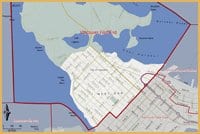Local political observers are keeping an eye on a proposal to split the riding of Vancouver-Burrard in two —and wondering how such a split might affect MLA Lorne Mayencourt.
If the proposed change goes through, it might push Mayencourt “into running federally,” speculates SFU political scientist Kennedy Stewart.
Should the government accept the new boundaries proposed by the BC Electoral Boundaries Commission, Vancouver-Burrard will be divided into two ridings: Vancouver-West End and Vancouver-False Creek.
Mayencourt has been considering running federally as a Conservative candidate, but at press time hadn’t announced his final decision. He is currently travelling in Italy and could not be reached for comment. But he told Xtra West in January that the federal Conservatives asked him if he would run for their party in the next election.
The proposed Vancouver-West End riding would encompass the western half of the current Vancouver-Burrard riding, including the West End, Coal Harbour and Stanley Park. Its eastern boundary would run along Thurlow St, from Sunset Beach to Davie, then along Burrard from Davie to the Vancouver Harbour.
If Mayencourt runs in the proposed West End riding, he will no longer have Yaletown voters to count on, Stewart points out.
“The loss of Yaletown for him is a big problem,” predicts Stewart. Though some speculate Coal Harbour with its tony condos may help Mayencourt, Stewart notes that many residential property owners in Coal Harbour are not BC residents and are therefore ineligible to vote.
Little Sister’s co-owner Jim Deva also believes the proposed changes could affect Mayencourt’s decision on whether or not to quit provincial politics and run federally. Mayencourt only won Vancouver-Burrard by a narrow 11-vote margin in the last provincial election, Deva points out.
A West End riding would be “more winnable for the NDP,” predicts Stewart, who ran federally as an NDP candidate in the Vancouver Centre riding in 2004.
Drag queen Joan-E agrees the NDP could win the West End in a provincial election. However, she is not so sure Mayencourt is awaiting a decision on the boundaries.
A federal election could be called as early as this fall, she points out, while the Electoral Boundaries Commission won’t submit its report to the BC legislature until next February.
“Lorne’s a little smarter than that,” says Joan-E, who supports Liberal MP Hedy Fry federally. If Mayencourt plans to make a jump to the federal Conservatives, he “would have to have the wheels in motion now.”
Meanwhile, the proposed Vancouver-False Creek riding would include the eastern half of Vancouver-Burrard, from Burrard and Thurlow Sts east to Yaletown, as well as the area immediately south of False Creek up to W 2nd, 6th and 4th Aves.
This means the Vancouver-Fairview district, south of the current Vancouver-Burrard district, will no longer include False Creek.
Stewart speculates that Vancouver-Fairview will turn Liberal without the False Creek neighbourhood, which he describes as “one of the most left of centre” areas of the city. As for the proposed new Vancouver-False Creek riding, its mix of False Creek and Yaletown voters leaves things “up in the air,” says Stewart.
The BC Electoral Boundaries Commission is independent of the government and reviews electoral districts every eight years. Chair Bruce Cohen, a BC Supreme Court judge, says the proposed changes are due to the swelling population in Vancouver, particularly Vancouver-Burrard.
“In Vancouver, there is a very large population and a growing population,” Cohen explains.
“The formula is the number of MLAs divided by the population. With 4.1 million people in the province, each MLA should represent 52,000 people. There are over 70,000 people in Vancouver-Burrard,” Cohen says.
The commission considered whether or not the districts could be rebalanced without adding a district, but it couldn’t, he adds.
A smaller riding is a positive thing, say Deva and Joan-E.
“It gives the West End a lot of clout,” says Joan-E, who adds that West Enders’ values “are not reflected by those in Yaletown.”
“It will probably end up being candidates who are really well suited to the area,” she says.
It could also have the effect of making people feel their vote counts more and “galvanize people to vote,” Joan-E adds.
“I think it would be a good development,” Deva says.
“There’s a concern with the displacement of the [queer] community” due to increasing rental costs in the West End, Deva continues. Having a West End riding could force the government to deal with West End issues and perhaps result in rent control and a rental complaints office in the community, says Deva.
Whatever the outcome, “it will be a good election night spectacle for us to watch,” concludes Stewart.

 Why you can trust Xtra
Why you can trust Xtra


